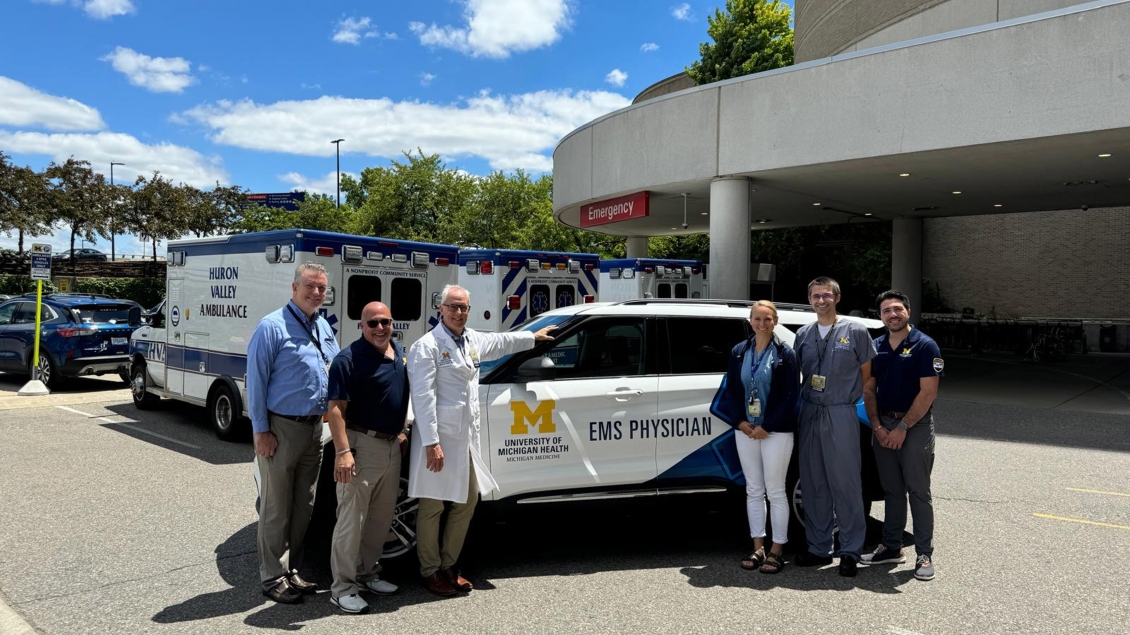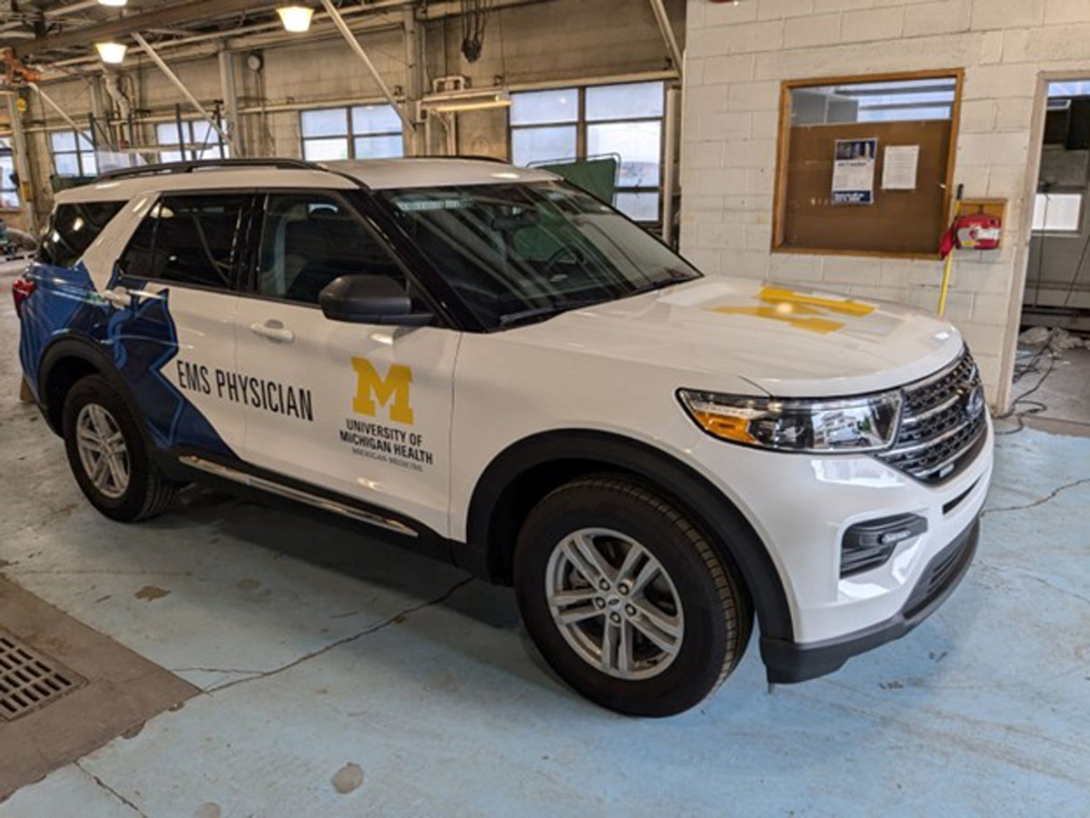
The Emergency Medical Services Fellowship curriculum is designed to provide comprehensive training through various educational experiences, hands-on clinical practice, and specialized learning opportunities.
Explore the sections below to learn more about the curriculum.
Tuesday mornings are dedicated to educational didactics based on the NAEMSP Core Curriculum Textbook and led by EMS Faculty. Format may include Lectures, Small Group, Simulations, Field Trips, Guest Speakers, Panel Discussions, and online modules to name a few. This is supplemented by a Statewide EMS Fellowship Quarterly Journal Club, an annual EMS-focused Residency Journal Club, and participation in the NAEMSP Medical Directors Course.
Fellow attendance at the NAEMSP Annual Conference will also be supported.
BE/BC EM fellows will pursue one or both of two options to maintain their primary board skills.
- Fellows may elect to participate in external moonlighting by working clinically in local EDs in the surrounding community. Prior fellows have participated in optional external moonlighting at sites including but not limited to Trinity Health sites, Beaumont sites, and Henry Ford sites. Wages earned are kept by the fellow and are supplemental to their GME salary. Fellows must follow all rules pertaining to external moonlighting as per the ACGME, UM GME and EMS fellowship-specific policies.
- If a fellow chooses not to maintain their primary board skills via external moonlighting, that fellow may work ~2 clinical shifts per month in the adult or pediatric EDs at U-M Medical School as a “super-resident” with oversight commiserate with their level of training by EMS Faculty.
The fellows have access to two physician response vehicles and will do multiple shifts doing scene response and medical oversight each month alongside local pre-hospital ground EMS agencies, including but not limited to:

1. Huron Valley Ambulance: private, not-for-profit community based ALS transporting service which also has MICU ground transport and community paramedic services.
2. Ann Arbor Fire Department: City-based BLS non-transporting agency that provides first response services.
3. Pittsfield Fire Department: Township-based BLS non-transporting agency that provides first response services.
4. Livingston County Ambulance: Third service county based ALS transporting agency.

The fellows will ride as active medical team members with Survival Flight, with the option to progress to full Flight Physician if appropriate criteria is met.
Shifts will be at both the University Base and the Livingston County Base. The fellows will respond to calls throughout the state and beyond. They will also be responsible for attending weekly grand rounds, presenting at the Survival Flight sponsored statewide EMS/RN conferences, and participating in the annual Safety Day among other activities.
The fellows will be a part of U-M Medical School disaster response teams, both in the ED (Emergency Medicine Preparedness Group, or EMPREP) and hospital wide (Emergency Management Operations Committee, or EMOC). They will also work with the broader U-M Medical School Division of Public Safety and Security disaster team (for example, to learn from and support UM Football pregame disaster planning).

Fellows will also be included on the Region 2S HealthCare Coalition, one of the committees made of local MCA and disaster leaders created by the state to coordinate the response to a disaster event on a regional level. Fellows will also get disaster experience by participating in courses such as Basic Disaster Life Support/Advanced Disaster Life Support, NIMS courses, and Center for Disaster Preparedness’ courses.
The fellows will attend monthly training sessions with the various Special Operations Teams listed below. With all three of these teams, the fellow is working with the HVA special operations medics. If the teams have a “call out” (a real life scenario requiring the expertise of these specialized teams), the fellow will respond to the real-life situation with the team to provide in person medical support and direction. These “call-outs” can be anywhere in the county or surrounding region.
Team is comprised of specialty trained fire-fighters from many different fire departments in the county with expertise in the safe extrication of patients from uniquely dangerous situations. Skills include high rope, confined spaces, grain bin, trench rescue, structural collapse, and large vehicle stabilization rescue capabilities. The medical support is supplied by specially trained HVA medics, with whom the fellow will work.
Team is comprised of fire-fighters from many different fire departments in the county specially trained in chemical, biological, radiological, nuclear and explosive materials. Medical support for the team is supplied by specially trained HVA medics, with whom the fellow will work.
Team is comprised of specially trained HVA medics who provide medical support for the Washtenaw County Metro/SWAT teams when needed.
The Department of Emergency Medicine at the U-M Medical School is home to nationally and internationally renowned experts in the realms of cardiac arrest, stroke, injury prevention, resuscitation, and health policy, topics which are intimately linked with prehospital care.
The department was recently named as the Clinical Coordinating Center for SIREN, a national research network focusing on clinical trials to improve patient outcomes in the acute setting. These opportunities allow us to produce leaders in prehospital research. The fellows will be expected to take advantage of and contribute to the research mission of the department and there is a Fellow Research Grant Award specifically designed to support scholarly activity.
The fellows will attend various meetings regarding the administration of the local, regional and state EMS systems in order to learn how to organize and run an EMS system. Some of these meetings may involve protocol reviews, cases to QI, or systems level concerns to address. The fellows will be expected to be actively involved in whatever “work” the committees are doing. Core faculty sit on each of these committees and will be available for fellow support. Examples of the administrative meetings include, but are not limited to:
- Washtenaw Livingston County Medical Control Authority Board meetings, Advisory Board Meetings, Data and Evaluation meetings, PRSO meetings, and QI meetings
- The State EMS Coordinating Committee Meeting
- Sub-Committees of the State EMS Coordinating Committee (Pediatrics, Critical Care Transport, Air Medical Transport, Legislation, etc.)
- State EMS Quality Assurance Task Force meeting
- SE MI Regional Protocol Meetings
- Regional 2S Disaster Preparedness Meetings
- Health EMS Medical Control Authority Meetings

The wilderness EMS experience are experiential based, including simulations within local, regional and/or state parks, backpacking trips to state parks, caving extrications simulations, and rock climbing ropes rescue training and simulations.
It will be run by EMS Faculty who are also FAWM (Fellows in the Academy of Wilderness Medicine) and other Wilderness faculty. It is timed to occur in September during the Wilderness Elective for medical students and residents, so that the fellows can simultaneously learn while helping to train younger providers.
Event Medicine is the a branch of EMS that plans, organizes and executes medical support for large scale mass gatherings or events.
The fellows will be expected to be involved in the planning and execution of the medical support and EMS response for a local events, such as the Dexter Ann Arbor Half Marathon, the Ann Arbor Marathon, the Ann Arbor Art Fair, and the UM Football games. In addition to the regular medical support for the participants, the fellows will have to be involved in creating the disaster plan in case a mass casualty should occur.